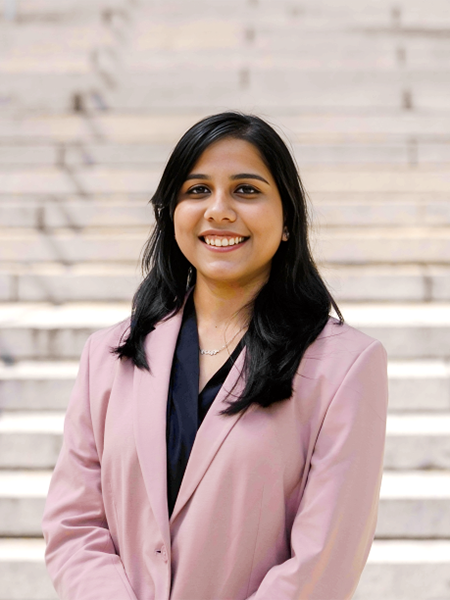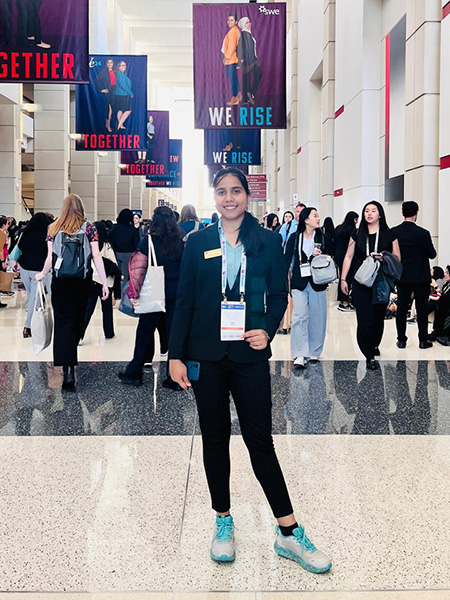Purdue Engineering graduate student profile: Paridha Talmale

Paridha Talmale, who is pursuing her master’s in engineering management degree, was the sole Purdue member of the ToTech team who placed first in Innovate-A-Thon, a competition that provides a unique opportunity for university students to generate new ideas, collaborate and recognize views from all team members.
The university students generate proposed solutions to real world problems, while receiving a scholarship and growing their professional networks and career opportunities.
She shares her thoughts on placing first, her future goals and how the Purdue Master of Engineering Management (MEM) program has provided not only the technical and management skills needed for her future careers but also important problem-solving knowledge.
What does the win mean to you?
Winning first place at the Innovate-a-thon wasn’t just a victory — it was a powerful validation of our collective creativity, commitment and ability to work collaboratively under pressure. More than just a competition, it was a proving ground where we took a concept and transformed it into something impactful within a tight deadline. The experience deepened our belief in the value of cross-functional teamwork and reinforced our dedication to building practical, forward-thinking solutions.
Can you explain your entry?
Our proposed solution, ToTech, is a 4-step smart farming system designed to empower small and mid-sized farms through sustainable, accessible technology. Our goal was to remove the barriers often associated with adopting precision agriculture — high costs, steep learning curves and complex infrastructure.
ToTech’s core pillars:
- Scalable Adoption: Farmers can start small and expand the system at their own pace.
- Affordable Technology: Instead of a large upfront investment, the system follows a return-on-investment-driven model that makes adoption financially viable.
- Data-Driven Decision-Making: Real-time analytics enable smarter, more informed farming decisions.
- Future-Proofing Farms: By leveraging AI-powered automation, ToTech helps farms stay competitive and resilient in the face of evolving challenges.
Why do sustainable farming practices matter?
Sustainability in agriculture is essential. It ensures that current farming methods meet today’s needs without depleting the environmental resources future generations will rely on. Sustainable practices promote soil health, conserve water, reduce dependence on chemical inputs, and ultimately protect ecosystems. Our system aims to make sustainability not just a moral imperative, but a profitable and practical path for farmers.

What did you learn? What are the next steps?
This project sharpened our problem-solving and innovation skills and gave us valuable hands-on experience in designing scalable solutions. Going forward, we hope to further develop ToTech and explore opportunities to pilot it on real farms. The potential for measurable impact — both economically and environmentally — is something we’re deeply excited about.
What was Bayer’s role in the Innovate-a-thon?
Bayer Crop Science played an important role in shaping our approach. Their mentorship was incredibly insightful. They helped us validate our problem statement and refine our solution based on real-world farming challenges. Learning directly from a company at the forefront of agri-tech innovation gave us the perspective we needed to make sure our idea was grounded.
Who are the members of team To-Tech?
Our virtual team brought together a unique blend of diverse skills.
- Makeña Verdugo, who recently earned her BE in Biological/Biosystems Engineering from the University of Arizona, led our R&D efforts with her strong background in agricultural systems.
- Oliver MacDonald, co-founder of QTexAI, brought entrepreneurial experience and strategic direction, helping us stay focused and organized throughout the sprint.
- My contribution was from a business and strategy standpoint, driving ideation and performing business model analysis.
How did you work together?
We followed a sprint format over the course of a month participating in structured workshops, engaging in mentoring sessions and collaborating remotely using digital tools. Despite the virtual setting, we built strong connections and maintained a focused workflow.
What are your future goals?
To be a part of initiatives that push the boundaries of what's possible in sustainable industry practices — particularly where innovation meets impact. Whether through entrepreneurship or by contributing to forward-thinking organizations, I aim to develop solutions that create long-term value. Interning at Panasonic Energy Corporation of North America is my first step toward realizing this vision.
How has Purdue’s MEM program helped?
It gave me a strong foundation in both technical understanding and strategic leadership. The combination of coursework, real-world projects and leadership opportunities helped me grow into a confident problem-solver, ready to take on challenges that blend engineering with business.
What was the biggest lesson learned from MEM?
The value of systems thinking. It taught me how to approach problems holistically balancing technical expertise with strategic foresight to design solutions that are effective and sustainable.
What advice would you give to others considering a master’s in engineering management?
Be proactive. Say yes to opportunities that stretch your abilities, especially those that push you beyond pure technical work. Leadership, communication and strategic thinking are all part of the growth journey in an MEM program. It’s a space where you can develop in multiple dimensions, but you must be willing to step up and engage.
